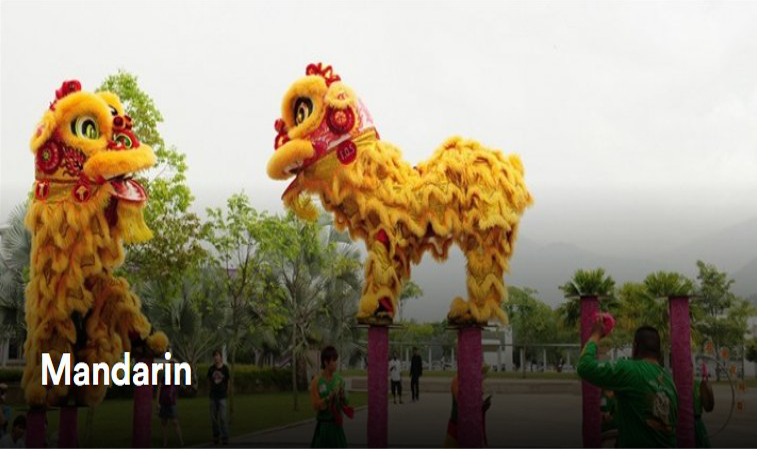Mandarin Course Malaysia (Chinese Language Beginner Class)

Mandarin is the world's most commonly spoken first language and the second most popular language on the Internet. As a result, more students are choosing to study this beneficial Chinese language course at UNM.
Studying Mandarin in Malaysia allows students to practice their language skills daily and gain a competitive edge in future job opportunities.
Our experienced Mandarin academics offer beginner to upper intermediate-level courses, focusing on listening, speaking, reading, and writing skills.
The Mandarin team at UNM offers various extracurricular activities, such as Mandarin Corner supervised by teachers and volunteers from the UNM Students' Union. They also conduct an Intensive Mandarin Summer Course for our international students that includes language-focused social events, including dinners, day trips, and on-campus Mandarin-speaking activities.
Official exam preparation
Once students have reached the necessary skills in Mandarin, the Language Centre offers them the chance to prepare for the Chinese Proficiency Test (HSK) (Hanyu Shuiping Kaoshi) is an international standardised exam that tests and rates Chinese language proficiency.
It assesses non-native Chinese speakers’ abilities in using the Chinese language in their daily, academic and professional lives.
HSK consists of six levels, namely the:
- HSK (level 1)
- HSK (level 2)
- HSK (level 3)
- HSK (level 4)
- HSK (level 5)
- HSK (level 6)
HSK (level 6) is the highest level-test takers who are able to pass this level can easily comprehend written and spoken information in Chinese and can effectively express themselves in Chinese, both orally and in written form.
See more about HSK exam here.
What are the benefits of learning Mandarin in Malaysia?
Learning Mandarin in Malaysia offers unique advantages because of the nation's multicultural environment and strategic position in Southeast Asia. Here’s why you should consider enrolling in this Chinese language course:
-
Quality education: UNM offers a well-structured Mandarin course with experienced instructors and comprehensive learning resources.
-
Regional relevance: Malaysia is located close to China and its participation in trade with Chinese-speaking countries makes Mandarin a highly relevant language to learn in Malaysia.
-
Networking opportunities: Being able to speak and write Mandarin opens doors to many areas, including potential career opportunities in Malaysia, Southeast Asia and China.
-
Multicultural advantage: Because many people in Malaysia speak Mandarin, students will be able to practice the language in a real-life setting.
We invite you to broaden your horizons, increase your employability, hone your language skills and develop personally with our Mandarin course today.
FAQ
How long will it take to learn Mandarin?
The time required to learn Mandarin varies and depends on individual factors such as the time invested, learning methods, dedication, and prior and current exposure to the language.
How can I start learning Mandarin?
You can enrol in Mandarin courses offered by educational institutions, hire a tutor, use language learning apps, attend language exchange meetups, practice with native speakers, or self-study using textbooks, online resources, and videos.
Learning Mandarin at UNM provides you with the opportunity to learn from experienced Mandarin teachers, practise with your coursemates, and access materials that will help you pick up the language faster.
Can I self-learn Mandarin?
Yes, self-learning Mandarin is possible with dedication and the right resources. However, guidance from experienced teachers, such as those who conduct our Mandarin courses at our university can significantly enhance the learning process.
Is Mandarin easy to learn?
The difficulty of learning Mandarin depends on various factors, including one’s
For some students, the absence of verb conjugations and relatively simple grammar might make it easier. However, the tonal nature of the Mandarin language and character-based writing system might be a challenge.
Is Mandarin harder than English?
Both Mandarin and English have unique aspects that might be challenging for different learners. Mandarin’s tonal nature and character-based writing system can be challenging for many, while English might present difficulties in spelling and irregularities in pronunciation and grammar. The difficulty in learning is quite subjective and varies from one person to another.
Is Korean or Mandarin harder?
Again, this varies from one person to another. Both languages have unique features that may be difficult for different students. Korean has a different alphabet and complex honorifics system while Mandarin has a tonal nature and character-based writing system. Additionally, one’s interest in the language will also influence the perceived difficulty.
What level of proficiency is required to enrol in the Mandarin course at UNM?
UNM offers a range of Mandarin course levels, from beginners to upper intermediate learners. You will not need prior knowledge of this Chinese language for entry into the beginner-level courses.
Will there be any certification provided upon completion of the Mandarin course at UNM?
Yes, upon successful completion of the course, students will receive a certificate that acknowledges their Mandarin proficiency level. This certificate is an asset for both academic and professional purposes.